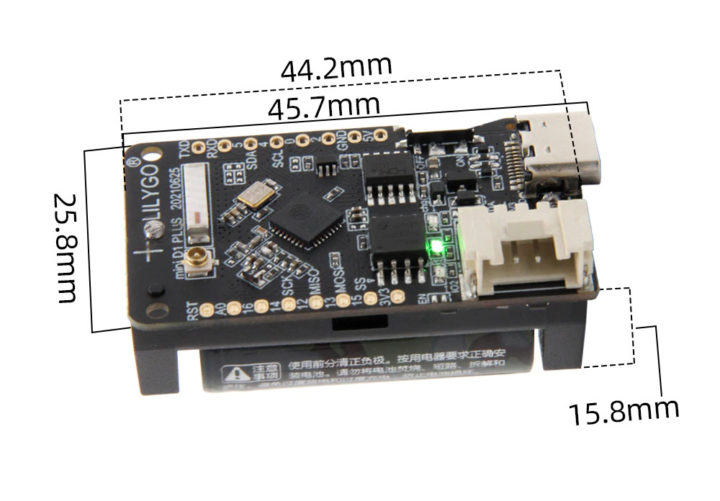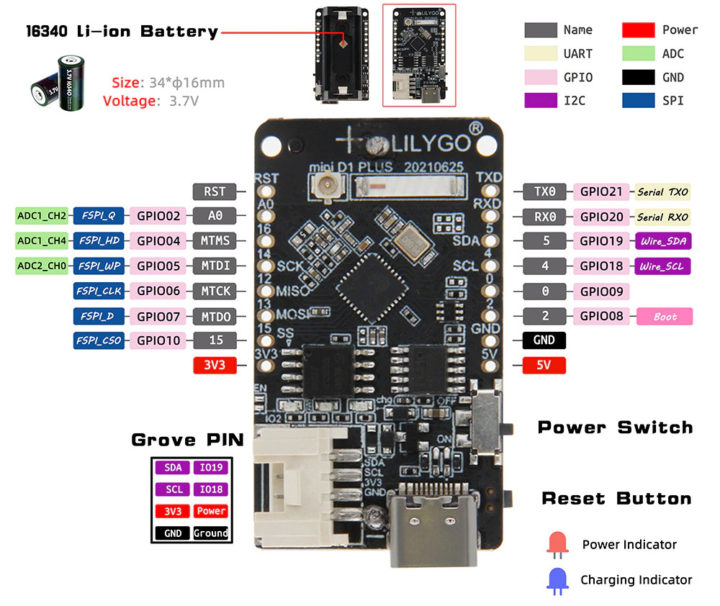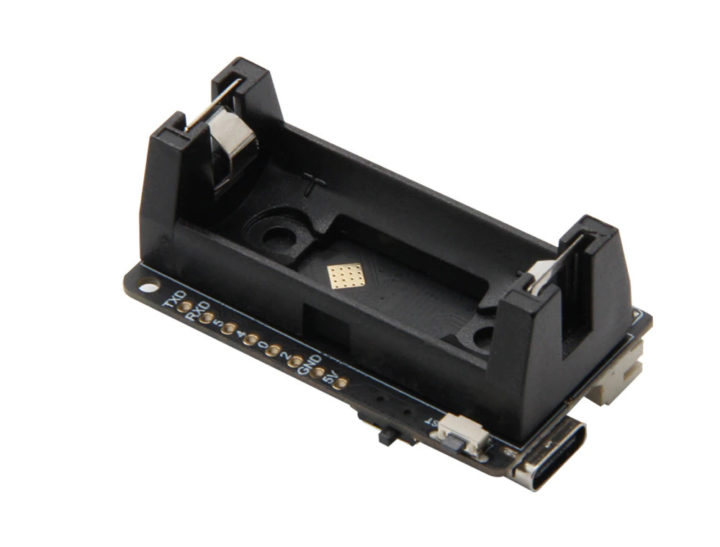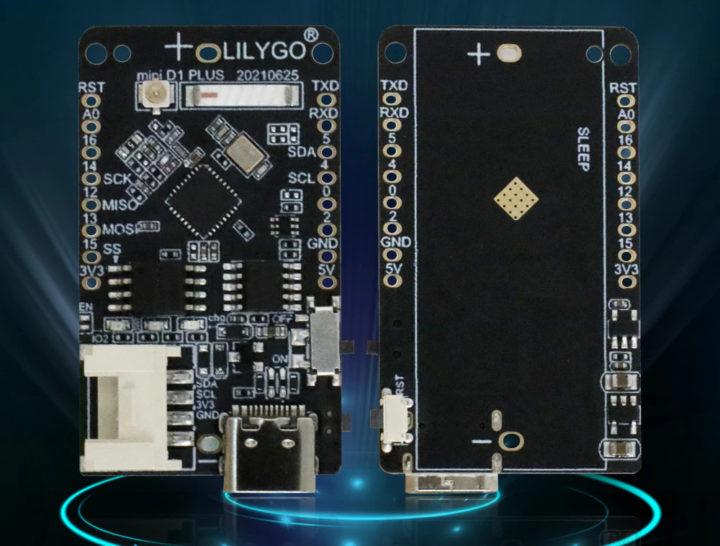It looks like ESP32-C3 floodgates have opened. We’ve just written about several NodeMCU ESP32-C3 boards, and now there’s another board with the RISC-V WiFI & Bluetooth processor. Meet LilyGo TTGO T-OI PLUS equipped with a 16340 battery holder.
Getting a battery-powered ESP32-C3 board could prove to be very interesting as ESP32-C3 power consumption is much lower than ESP8266 and ESP32, notably in deep sleep mode, where the RISC-V processor consumes just 5uA, against 20 uA for ESP8266 and ESP32, and the difference is even greater in light sleep mode (ESP8266: 2000 uA vs ESP32-C3: 130 uA).

- SoC – Espressif Systems ESP32-C3 single-core RISC-V processor @ 160 MHz with 2.4 GHz WiFi, Bluetooth 5.0 LE
- Storage – TBD flash (probably 2MB or 4MB)
- Antenna – Ceramic antenna and IPEX connector
- USB – USB-C port for power and programming
- Expansion
- 2x 8-pin headers with 12x GPIO, 1x SPI, 1x UART, 3x ADC, 5V, 3.3V, GND
- 4-pin I2C Grove connector
- Misc – Power and charging LEDs, Reset button, power switch
- Power Supply
- 5V via USB Type-C port
- Holder for 3.7V 16340 LiPo battery plus charging circuit
- Dimensions – 45.7 x 25.8 x 15.8 mm

LilyGo points to Github for documentation and sample code with one Arduino sketch scanning WiFi networks, as well as Windows & Mac drivers for CH34x USB to serial chip. Note that the repository is for the earlier TTGO T-OI board based on ESP8266 chip. Arduino ESP32 core’s development branch already supports ESP32-C3, but at this time, the code may have to be tweaked to make it work on third-party boards, as I’d assume it has been developed on the official ESP32-C3-DevKitM-1 development kit.
LilyGo TTGO T-OI PLUS can be purchased on Aliexpress for $4.68 plus shipping, or $4.49 if you’d like to do away with the battery holder for a thinner board and/or to solder your own battery.



Jean-Luc started CNX Software in 2010 as a part-time endeavor, before quitting his job as a software engineering manager, and starting to write daily news, and reviews full time later in 2011.
Support CNX Software! Donate via cryptocurrencies, become a Patron on Patreon, or purchase goods on Amazon or Aliexpress





This is pretty cool. I’ve tried a few 16340 batteries in the past for such use cases as I found that their form factor and capacities are well suited to being used in small radio devices. But each time I only got batteries with fake capacities, measuring in the 160-250mAh only when 1.0-1.2 was what I was hoping for.
Weird battery standard.. Is there a technical reason to not just use a couple of AAA’s in series?
For a point of comparison I looked up what a bluepill draws on sleep:
https://jeelabs.org/2018/standby-current-f103/
Seems can go down to 3 µA. So similar ballpark (though the low power L line goes much lower)
Such battery’s form factor is really great for *replaceable* ones. Usually you can even use CR123A instead. However, the way the board is made also easily allows to solder flat batteries, and for many project that could be an even better option. For example a 802545 will be exactly the size of the board and only 8mm thick, with capacities of 800-900mAh. For 2 extra mm, a 102545 brings you 1Ah.
It’s worth noting that even if the chip itself draws very little power in deep sleep, on most boards there are other components that frequently draw more power, especially the LDO, and on some boards even LEDs… it’s actually difficult to find boards with actual total deep sleep power draw close to the chip’s advertised values.
Absolutely! And sometimes it’s the USB UART as well, which cannot be disabled, and which, if not powered, will drive the rx/tx lines low and draw juice again.
Which makes a case for someone to build a better Mouse trap ?
If you can’t shut everything down then you’re just dreaming about ultra low power sleep. Measure to know truth
I’m wondering how practical it would be to use a MOSFET to disconnect the ground of external chips when unused. This would keep the pull-ups at their rest voltage and could definitely give good results for those supporting it. For LDOs there’s little hope, better use purposely built ones with high efficiency, possibly doubling them with a stronger one that can be disabled when in sleep mode.
What software/RTOS/framework can be used, from where? What IDE to build on? Loading compiling, linking loading code?
I guess for now this is limited to the Arduino IDE, which probably means that as long as you can organize your code in a setup() and a non-blocking loop() function that should be seamless, otherwise you can quickly go into trouble.
Yep – getting that set up now. Thanks
They seem to have a new revision. It’s still listed as v1.0, but the component layout is substantially different. The antenna is smaller.
The only note I’ve found is on the github repo which says:
https://github.com/Xinyuan-LilyGO/LilyGo-T-OI-PLUS
New version:**The new version has fixed the glitch that caused crystal burrs to start wifi and ble reset**
You can see the new version on Ali and Taobao. Though on the official website the picture remains as before
Taobao: https://url2.cnx-software.com/Dn61F
Aliexpress: https://fave.co/3MK7ROk
I guess this is a good sign. Nice to see the product is improved and they didn’t just move on
hi anyone knows how to address the built in led ? or the adc power pin ? thanks